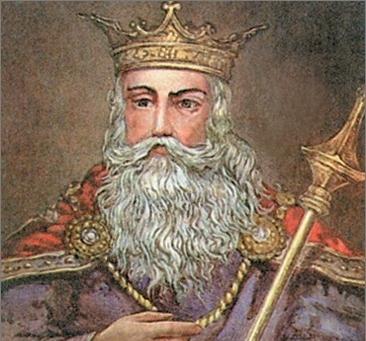In 1211, the boyars of the ancient Russian city of Galich were elevated to the throne of the ten-year-old Daniil Romanovich Galitsky. A year later, his father died, and the willful boyars expelled the boy, depriving him of his fatherland and power. In exile, he had to live with Andrei (the Hungarian king) and Leshko Bely (the Polish prince). This continued until the 20th anniversary of the prince. Fate was merciful to him. In 1221, princely feuds began, during which the great-grandson of Vladimir Monomakh managed to ascend the throne.
The beginning of the reign
Daniil Galitsky received his baptism of fire in the war against the Hungarians and Poles, who constantly invaded Russia. His father-in-law became Mstislav Udaloy. By that time, the Volyn prince had gathered a large squad. Unfortunately, the reign of Daniil Galitsky did not start very well. In 1223, he, along with a number of Russian princes, suffered a crushing defeat on the Kalka River from Genghis Khan temniks - Subedey and Jebe.
Expansion
But still, we must admit that the prince was an excellent manager. By 1229, Daniil Galitsky united all the Volyn lands into one big principality. In an effort to expand ownership, the Volyn prince organized several military campaigns in South Russia. In 1238, he captured Galich and began to be known as Prince Galitsky and Volynsky. Before the invasion of Batu, Daniel managed to make several successful trips to the restless neighbors - the Chernigov, Seversky and Pinsk princes. Naturally, with the "redistribution" of princely thrones, he was the protagonist.
Golden Horde
The Batyev invasion completely ruined the Galician-Volyn principality. A huge number of cities and villages were burned. Thousands of people were captured by the Mongols. Daniel Galitsky himself fled with his family to Hungary. After the Horde left, he returned and began to restore the cities destroyed by the Mongols. But he, like other Russian princes, had to recognize the power of the khan and pay tribute.
Yaroslavl battle
At the same time, Galitsky had to start a war against Western neighbors - supporters of Rostislav Mikhailovich (prince of Chernigov). In 1245, Rostislav, together with Hungarian and Polish knights, surrounded the city of Yaroslav. Daniil of Galitsky crossed the San River with his army and hastened to help the besieged city. The battle took place quite near him. Prince Galitsky built three of his regiments in a row (on the left - the regiment of Daniel, on the right - his brother Vasilka and in the center - the regiment of militias led by the court Andrey). The Hungarian knights launched an attack on the central regiment, which, unable to withstand the blow, began to retreat to the San River. The right regiment was attacked by Polish knights. Cornflower successfully repelled the attack. Daniel made his way to the rear of the reserve regiment of the Hungarians and completely defeated him. Seeing this, the remaining Hungarians and Poles were frightened and fled from the battlefield. The victory in the Yaroslavl battle ended the bloody 40-year struggle for the unification of the Galician-Volyn Rus. This event was the greatest achievement of the great-grandson of Monomakh.

Death
In the last years of his life, Daniil Galitsky, whose biography was considered in this article, did not wage any wars. He died in 1264 and was buried in the city of Hill. One of the chroniclers, mourning his death, called the prince "second in Solomon."